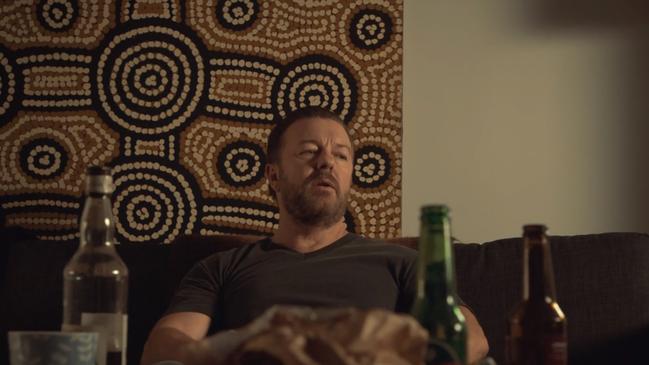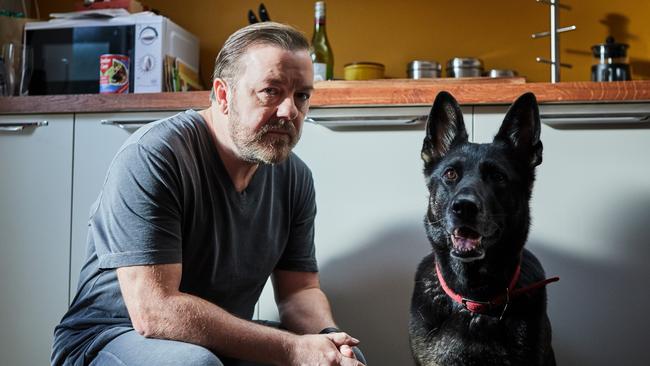The thing about sadness we don’t often acknowledge
Ricky Gervais’ Netflix series After Life addresses the topic of suicide in a bold and radically new way, writes Claire Harvey. And in doing so, it also nails something about sadness we often forget.
If you haven’t already watched Ricky Gervais’ new series After Life, go and do it right now.
I wept gently (but not in an aesthetically pleasing way) through all six episodes, at least partly in surprise that the curmudgeon-in-chief of our age, the uber-mocker who has made vicious fun of everything and everyone, from the most celebrated to the most ordinary, could make something so revealing and open-hearted.
It’s the antidote, in a lot of ways, to 13 Reasons Why, the big Netflix parent-worrier of last year, which told the backstory of a young girl’s suicide.
RELATED OPINION: How looking forward helped me leave sadness in the past
Gervais’ show addresses the topic of suicide in a bold and radically new way. A good way, I think.
After Life sees Gervais, playing a recently widowed journalist from a small-town newspaper, walk to the edge of suicide and find himself unable to leap off. He doesn’t so much choose life as find it impossible to shake off, even though its banalities make him homicidal and he’d cheerfully choke the man crunching ice from a glass at a nearby pub table.

He is saved, in the first instance, by his dog, who needs feeding. “If you could open a tin, I’d wouldn’t be here,” Gervais’ character Tony says to the dog, who just smiles and lolls her tongue. He talks, all the time, about his plan to enjoy being as much of a grumpy git as he likes, then kill himself when it all gets too much.
MORE FROM CLAIRE HARVEY: Shooters aren’t about sport. They’re all about death
In a context where suicide “experts” have spent a long time telling all of us this is a topic that we should block our ears and run away from, I think it’s super-brave and really important.
Gervais’ other great achievement is to nail something about sadness we don’t often acknowledge.
Often, what we call “sadness” or “depression” is actually grief: loss, a lament.
Grief is all around us, and it doesn’t necessarily have anything to do with death. In fact, I think grief can be all the more painful when nobody is dead — when, in fact, the source of our problem is still resolutely alive, and just choosing to leave us, or to be irrationally cruel, or to be addicted, or to decide we aren’t quite as interesting as they thought.
MORE FROM CLAIRE HARVEY: What unites vile, grubby trolls? They all hate women
When someone’s partner dies, we crowd in with flowers and casseroles and sympathy. Widows and widowers have the dignity of universally acknowledged pain.
But when a relationship ends because of something other than death, instead of offering
sympathy we offer justification, or blame, or just judgment. She must have been cheating on him. He must have been working too much.

The pain, I think, of losing a long-term partner is horrific in many of the same ways as bereavement — there’s just as much starkness in the uncreased pillow and the microwaved dinner for one; and often it’s accompanied by the inescapable knowledge that the most beloved person in the world now can’t stand the sight of you and may, indeed, have chosen to point out your many failings in both public and private.
Does it make it better that he or she is still walking around, possibly with Roland from the software start-up round the corner, probably with a new haircut and minus 10 kilos? No, I don’t think that does make it better, or easier. I think it’s excruciatingly painful, and the pain is increased by the fact people think you probably caused it.
MORE FROM CLAIRE HARVEY: A generation of girls are wrecking their faces
Worse, when a relationship ends and a child, manipulated by one parent, refuses to see the other parent, or withholds affection because she or he is so desperately hurt at the separation, there’s none of the acknowledgment you might expect if that child had died.
The child, alive, is letting you know she thinks you’re an idiot and an arsehole, or just sulking in the back seat of the car — that’s a cause for grief. But do we acknowledge it? Never. We’re straight back to judgment.
Funny, actually, Ricky Gervais has made a career of pretending to be a judgmental prick. The Office, at times, felt like an excruciating piss-take of ordinary people’s frailties.
Now, actually, I think it was a celebration of “normal” people in all their weirdness; of life’s little beauties. That’s brave.
Claire Harvey is the deputy editor of the Sunday Telegraph.


